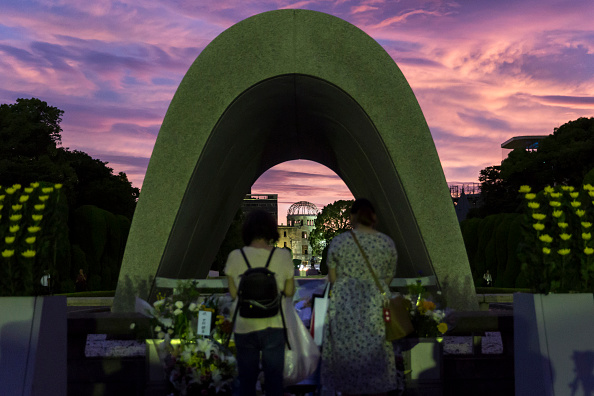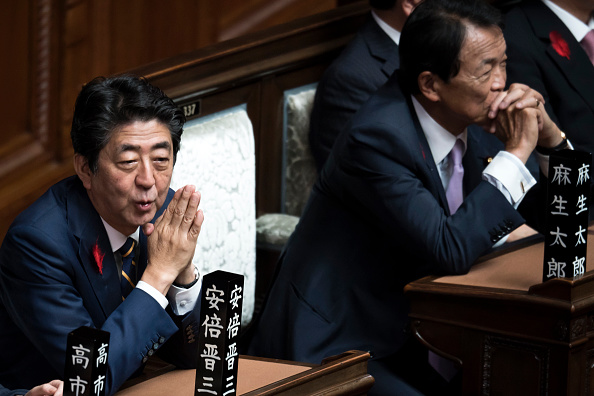On three occasions over the past 50 years, Japan weighed the merits and disadvantages of developing nuclear weapons. The first delicate moment came in the 1960s, after China began testing nuclear weapons. Then, during the 1990s after the Cold War, Japanese officials worried that Washington might feel less resolved in defending Japan from Moscow’s nuclear might. Most recently, Japan faced a major new challenge to its west after North Korea developed nuclear weapons in 2006. At each juncture, however, Japanese security strategists concluded that it made more sense to rely on the extended deterrence provided by the United States. In exchange, Japan presented itself to U.S. policymakers as a linchpin for peace and stability in Northeast Asia, a regional hub for the deployment of U.S. troops and military equipment (as it was during the Korean and Vietnam Wars), and a bulwark against China.
Today, the U.S. security guarantee looks less and less reliable. This summer, President Donald Trump repeatedly called the security treaty unfair and reportedly mused in private about canceling the treaty altogether. He has tolerated North Korean missile tests that threaten Japan. And during his election campaign, he suggested that it might even serve Japanese and South Korean interests if both nations developed nuclear weapons. There are still powerful historical, cultural, and institutional reasons for Japan to resist going nuclear, but Biegun is right to worry that the country could head in that direction—though it is the U.S. president, as much as North Korea, who may push Tokyo toward nuclear proliferation.
THE NUCLEAR TABOO
As the only country to experience a nuclear bombing, Japan is a leading proponent of nonproliferation. Quietly, however, it pursues a strategy of “nuclear hedging,” preserving the capacity to develop nuclear weapons without intending to do so. Officials occasionally reveal the existence of this policy. In the wake of the Fukushima nuclear disaster in 2011, for example, former Defense Minister Shigeru Ishiba, a prominent Liberal Democratic Party politician, explained that Japan couldn’t shut down its nuclear power plants because the nuclear fuel cycle—the industrial processes that turn uranium into electricity and recycle the waste—was necessary in order to maintain “technical deterrence.” Japan is the only nation that has the ability to enrich uranium and reprocess plutonium but has no nuclear weapons.
In theory, Japan could develop a small atomic arsenal in as little as a year or two. It would need to produce weapons-grade plutonium, a process that would most likely require repurposing civil reactors. It would also need to reengineer its advanced space launch rockets to deliver nuclear warheads. Japanese scientists are technically capable of both tasks and could accomplish them on a tight timetable if the government felt compelled to minimize concerns about safety, secrecy, reliability, and accuracy (and shirk its international obligations). A more thorough, careful process in keeping with Japan’s usual modus operandi would take three or four years. Scientists would face another hurdle in finding a place to test weapons in the crowded Japanese archipelago. The most recent known government study, conducted in 2006, concluded that Japan had the technical expertise and facilities to develop a small nuclear warhead but that doing so would take three to five years and cost over $2 billion.
The biggest obstacles to a Japanese nuclear weapons program aren’t technical or logistic; they are political, legal, and cultural. Since 1972, following the return of Okinawa from the United States and the removal of nuclear weapons stationed there, Japan’s prime ministers have embraced “three non-nuclear principles” as a morally and politically binding norm: no manufacture, no possession, and no entry of nuclear weapons controlled by other nations (in practice, that third principle has been breached to allow nuclear-armed U.S. warships to make port calls). In addition, Japan’s championing of the Treaty on the Non-Proliferation of Nuclear Weapons, the Comprehensive Nuclear-Test-Ban Treaty, and other nonproliferation instruments reinforces the political constraints on going nuclear, as does the collective memory of the bombing of Hiroshima and Nagasaki. Japanese Prime Minister Shinzo Abe shows no sign of seeking to challenge this deeply rooted antipathy.
Opposition to nuclear weapons is particularly strong in the academic and scientific communities, including in the nuclear technology field. Combined with the robust International Atomic Energy Agency monitoring presence in Japan, this culture of ingrained hostility to nuclear weapons would make it nearly impossible for Japan to pursue a clandestine path to the bomb.
Japanese diplomats would also fret about the security costs of going nuclear. An indigenous nuclear program would be intensely provocative to China, sparking a further acceleration in Beijing’s buildup of nuclear and conventional weapons. Pursuing nuclear weapons would also increase the risk of a preemptive nuclear strike from North Korea and provoke South Korea to seek its own nuclear arsenal, inflaming regional tensions.

WEAPONS OF LAST RESORT
The scientific establishment would likely comply with a directive to produce nuclear weapons only in the event of a sharp deterioration in Japan’s security situation. In the imaginings of Japanese policymakers, the most likely scenarios would be if South Korea goes nuclear or if the Koreas unify and keep Pyongyang’s existing arsenal. Japanese officials watched with interest when South Korean President Moon Jae-in extolled the benefits of unification with North Korea in an August 15 speech commemorating liberation from Japan.
While Moon has insisted that a unified Korea would not retain nuclear arms, Japan remains wary in light of the pro-nuclear sentiments on both halves of the Korean peninsula. Unlike in South Korea, where mainstream politicians and newspaper columnists advocate for an indigenous nuclear weapons program, in Japan advocates for nuclear weapons remain largely on the far-right fringe. It is, however, increasingly acceptable to discuss nuclear arms as a future policy option. After North Korea’s first nuclear test in 2006, for example, then Foreign Minister Taro Aso called for a public debate about the circumstances that would warrant a serious reconsideration of Japan’s non-nuclear policy.
Of course, Tokyo’s stance on nuclear weapons is shaped most fundamentally by its faith in the credibility of U.S. nuclear deterrence. Over the years, that credibility came into question when the United States lost the Vietnam War, withdrew from the Philippines, failed to prevent China and then North Korea from acquiring nuclear weapons, and reduced its own nuclear arsenal.
Any Japanese move toward developing nuclear weapons should be seen as a cry for help. In the past, when Japanese leaders have hinted to Washington that they were considering going nuclear, their intent was to encourage a stronger U.S. security commitment to Japan. Aso’s call for a public debate in 2006 elicited a reaffirmation of that commitment from Secretary of State Condoleezza Rice. Aso followed an old script: in 1964, Prime Minister Eisaku Sato similarly raised the prospect of going nuclear to persuade President Lyndon B. Johnson to strengthen Washington’s pledge to safeguard Japanese security. Washington should learn from that history and work to assuage Japan’s fears, starting with clear statements from Trump that reassure Tokyo, refuse to pander to North Korean provocations, and discourage nuclear proliferation in an already tense region.

This article was originally published on ForeignAffairs.com.






